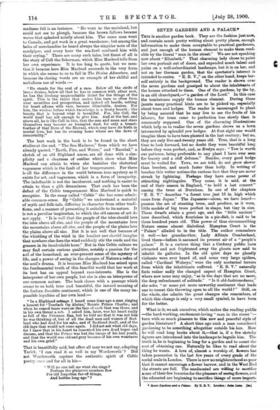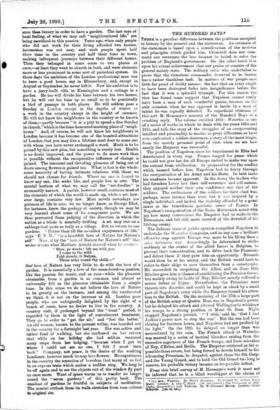SEVEN GARDENS AND A PALACE.* Tsris is another garden book.
They are the fashion just now, and contain much pretty writing about pretty places, enough information to make them acceptable to practical gardeners, and just enough of the human element to make them read- able by the literal "man in the street." We are not speaking now about "Elizabeth." That charming lady chose to paint her own portrait out of doors, and expended much talent and pains on a well-subordinated landscape, but it is on her, and not on her German garden, that the spectator's interest is intended to centre. "E. B. V.," on the other hand, keeps her- self entirely in the background. The reader is shown over the seven gardens and gossiped to about the inhabitants of the houses attached to them. One of the gardens, by the by, is an old churchyard,—" a garden of the Lord." In this case the tombstones supply the human element. During these jaunts many practical hints are to be picked up, especially about trees and hedges. The reader is encouraged to plant by being assured that he may live to see the fruits of his labours, for trees come to perfection less slowly than is commonly supposed. One of the charming illustrations which help us to realise the seven gardens shows us a lawn intersected by splendid yew hedges. At first sight one would imagine them to have been planted in the last century; but no, they are only five-and-twenty years old. True, that is a long time to look forward, but no doubt they were beautiful long before they were perfect, and, as Evelyn says : "Yew is worth our patience, being preferable to any plant I have ever seen for beauty and a stiff defence." Besides, every good hedge must be waited for. Yews, we are told, do not grow slower than beeches, and much faster than holly. In writing of beeches this writer notices the curious fact that they are never struck by lightning. Perhaps they have some power of attracting nightingales. They come, it is said, at the end of their season in England, "to hold a last concert" among the trees at Burnham. In one of the chapters "E. B. V." describes "a forest tree just 13 in. high which came from Japan." The Japanese—alone, we have heard— possess the art of stunting trees, and produce, as it were, little models of big trees perfect in shape, but tiny in size. These dwarfs attain a great age, and the "little ancient" here described, which flourishes in a pie-dish, is said to be three hundred years old. This power of thus circumscribing Nature seems almost diabolical. Hampton Court is the " Palace " alluded to in the title. The author remembers it well — her grandmother, Lady Albinia Cumberland, lived there—before it assumed its present air of a "people's palace." It is a curious thing that a Cockney public have attracted and not frightened away the ghosts now said to inhabit its galleries. In the old quiet days no ghostly visitants were ever heard of, and some very large spiders, called " Cardinsl Wolseys," were the only nocturnal terrors from which the inhabitants suffered. "E. B. V." naturally feels rather sadly the changed aspect of Hampton Court, where now none may enjoy, "as in the days that are no more, the deep refreshment of solitude." "Is it old-fa.shionedness," she asks, "or some yet more unworthy sentiment that leads one to resent this throwing open to all the world ? " Still, on the whole, she admits the great changes she remembers, of which this change is only a very small symbol, to have been for the better.
What is it, we ask ourselves, which makes the reading public —the hard-working, excitement-loving man in the street "— turn with so much pleasure to this new and peaceful style of garden literature ? A short time ago such a man considered gardening to be something altogether outside his ken. Now he will read long books about it,—that is, if a few sketchy figures are introduced into the landscape to beguile him. The truth is, he is beginning to long for a garden and to count the cost of obtaining one. Naturally he likes to read about the thing he wants. A love of, almost a worship of, flowers has taken possession in the last few years of every grade of the social scale in London. There is now no neighbourhood so poor that it cannot encourage a flower barrow, and in the West End the streets are full. The uneducated are willing to sacrifice some of their few luxuries for the pleasure of seeing flowers, and the educated are beginning to sacrifice things of more import- • Seven Gardens and a Palace. By E. B. V. London : Join loss. Dal
since than luxury in order to have a garden. The last rays of local feeling, of what we may call "neighbourhood life," are being sacrificed to this passion. Years ago, when only people who did not work for their living afforded two houses, locomotion was not easy, and such people spent half their time in the country and half their time in town, making infrequent journeys between their different homes. Thus they belonged in some sense to two places at once,—at least they went to church in both, and were elements more or less prominent in some sort of parochial system. In those days the ambition of the London professional man was to have a good house, say in Bloomsbury, and, except in August or September, he never left it. Now his ambition is to have a jerry-built villa in Kensington and a cottage in a garden. He too will divide his time between his two homes, but he will cut his time up so small as to be practically a bird of passage in both places. He will seldom pass a Sunday in London except in the depths of winter or a week in the country except in the height of summer. He will not know his neighbours in the country or be known of them,—partly because "it is a pity to spend a fine Sunday in church," which is the time-honoured meeting place of "neigh- bours." And, of course, he will not know his neighbours in London because it has become one of the boasted attractions of London that you may live a lifetime next door to some one with whom you have never exchanged a word. Much is to be gained by this new plan, but something is surely lost. Health is no doubt improved, and the power to do more work than is possible without the recuperative influence of change is gained. The innocent and elevating pleasure of being out of doors among flowers is gained too. What is lost is the whole- some necessity of having intimate relations with those we
should not choose for friends. Where no one is bound to know any one, like seeks like, and people live in sets. The
mental horizon of what we may call the " set-dweller " is necessarily narrow. A parish, however small, contains most of the elements of which the world is made up, while a set, how- ever large, contains very few. Most novels nowadays are pictures of life in sets; we no longer know, as George Eliot, for instance, knew, the geology of society, though we may be very learned about some of its component parts. We are thus prevented from judging of the direction in which the nation as a whole is mentally drifting. A set may trot on a cabbage-leaf quite as truly as a village. But to return to our gardens. "Better than all the so-called enjoyments of life," says "B. V. B.;' "is a heartfelt love of Nature for Nature's self." Now, if by the "love of Nature for Nature's self" this
writer means what Matthew Arnold showed when he wrote- " Blow, ye winds ! lift me with you. I come to the wild.
Fold closely, 0 Nature, Thine arms round thy child,—" that love of Nature has very little to do with the love of a garden. It Is essentially a love of the nnenclosed—a passion, like the passion for music, and as rare—while the pleasure obtainable from a garden is as common and almost as universally felt as the pleasure obtainable from a simple tune. In this sense we do not believe the love of Nature to be greatly on the increase, and among the uneducated we think it is not on the increase at all. London poor people, who are unfeignedly delighted by the sight of a bunch of roses, have no desire to live in the country. A country visit, if prolonged beyond the "treat" period, is regarded by them in the light of convalescent treatment. They go in order to "get the air," and "feel the better?' An old woman, known to the present writer, was boarded out in the country for a fortnight last year. She was active and rather fond of walking, but she confessed on her return that while on her holiday she had seldom ventured many steps from her lodging, "because when I got to where I could not see no one, I felt I must turn back." Company, not peace, is the desire of the working Londoner, however much he may love flowers. He experiences in the country the sensation of boredom that many of us feel
in an express train which makes a sudden stop. We long to be off again and to see the objects out of the window. fly past illionce more. Want of space warns- to wander no longer round the "seven gardens" -of his pretty book. The smallest of gardens tis fruitful in subjects of meditation.
The mental outlook from its walls stretches from rose culture to original sin.



































 Previous page
Previous page